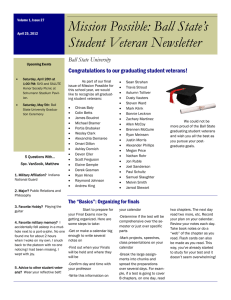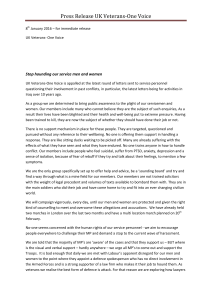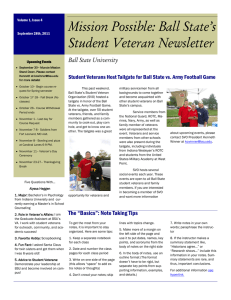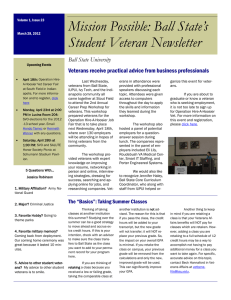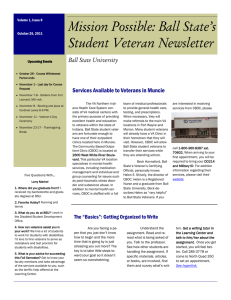Ball State conducts research about student veterans
advertisement
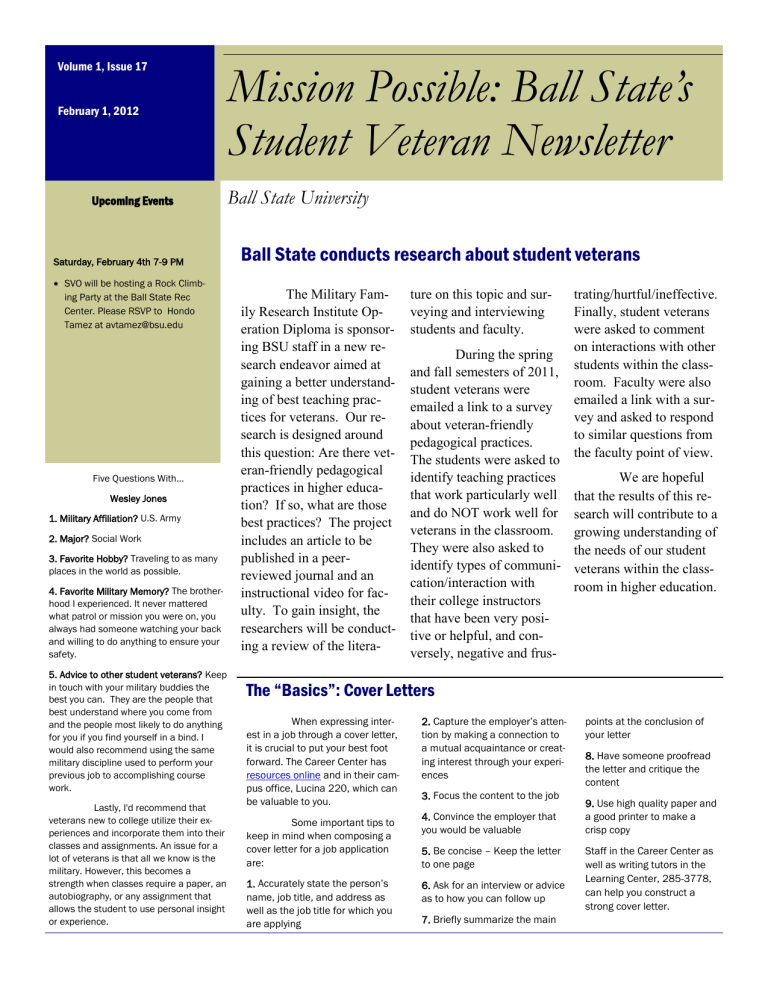
Volume 1, Issue 17 February 1, 2012 Upcoming Events Saturday, February 4th 7-9 PM SVO will be hosting a Rock Climbing Party at the Ball State Rec Center. Please RSVP to Hondo Tamez at avtamez@bsu.edu Five Questions With… Wesley Jones 1. Military Affiliation? U.S. Army 2. Major? Social Work 3. Favorite Hobby? Traveling to as many places in the world as possible. 4. Favorite Military Memory? The brotherhood I experienced. It never mattered what patrol or mission you were on, you always had someone watching your back and willing to do anything to ensure your safety. 5. Advice to other student veterans? Keep in touch with your military buddies the best you can. They are the people that best understand where you come from and the people most likely to do anything for you if you find yourself in a bind. I would also recommend using the same military discipline used to perform your previous job to accomplishing course work. Lastly, I'd recommend that veterans new to college utilize their experiences and incorporate them into their classes and assignments. An issue for a lot of veterans is that all we know is the military. However, this becomes a strength when classes require a paper, an autobiography, or any assignment that allows the student to use personal insight or experience. Mission Possible: Ball State’s Student Veteran Newsletter Ball State University Ball State conducts research about student veterans The Military Family Research Institute Operation Diploma is sponsoring BSU staff in a new research endeavor aimed at gaining a better understanding of best teaching practices for veterans. Our research is designed around this question: Are there veteran-friendly pedagogical practices in higher education? If so, what are those best practices? The project includes an article to be published in a peerreviewed journal and an instructional video for faculty. To gain insight, the researchers will be conducting a review of the litera- ture on this topic and surveying and interviewing students and faculty. During the spring and fall semesters of 2011, student veterans were emailed a link to a survey about veteran-friendly pedagogical practices. The students were asked to identify teaching practices that work particularly well and do NOT work well for veterans in the classroom. They were also asked to identify types of communication/interaction with their college instructors that have been very positive or helpful, and conversely, negative and frus- trating/hurtful/ineffective. Finally, student veterans were asked to comment on interactions with other students within the classroom. Faculty were also emailed a link with a survey and asked to respond to similar questions from the faculty point of view. We are hopeful that the results of this research will contribute to a growing understanding of the needs of our student veterans within the classroom in higher education. The “Basics”: Cover Letters When expressing interest in a job through a cover letter, it is crucial to put your best foot forward. The Career Center has resources online and in their campus office, Lucina 220, which can be valuable to you. Some important tips to keep in mind when composing a cover letter for a job application are: 1. Accurately state the person’s name, job title, and address as well as the job title for which you are applying 2. Capture the employer’s attention by making a connection to a mutual acquaintance or creating interest through your experiences 3. Focus the content to the job 4. Convince the employer that you would be valuable 5. Be concise – Keep the letter to one page 6. Ask for an interview or advice as to how you can follow up 7. Briefly summarize the main points at the conclusion of your letter 8. Have someone proofread the letter and critique the content 9. Use high quality paper and a good printer to make a crisp copy Staff in the Career Center as well as writing tutors in the Learning Center, 285-3778, can help you construct a strong cover letter.

